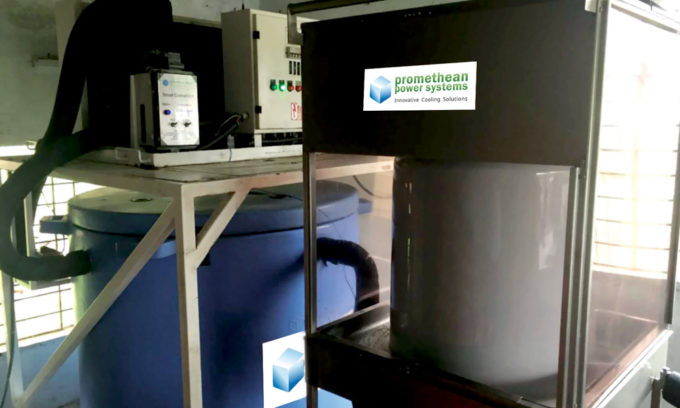Imagine you’re a dairy farmer in a rural Indian village. Your village only gets seven hours of power a day, which isn’t enough to operate a traditional milk chiller to keep your milk from spoiling.
Diesel generators are a flawed option, since they’re expensive and harmful to the environment. So your milk has to travel many miles to a chilling center. If bacteria’s already built up in your milk, it gets dumped. If it’s still safe to use in some form, a dairy processor only gets a 7 percent margin—versus 27 percent on dairy products that demand high-quality raw milk.
Promethean Power Systems changes all that. The company’s thermal energy storage system serves 60,000 farmers throughout India, and has replaced roughly 3 million liters of diesel fuel. What’s more, farmers are able to get more money because the dairy processors buying their milk, now a permanent off-taker, make a higher margin on their milk, according to Promethean co-founder Sam White. This win-win makes an enormous impact on the farmers’ business operations and success.
Promethean’s thermal storage technology offers instant cooling and backup cooling power. Promethean’s technology has many other applications, including mobile chilling that eliminates the need for compressors and transporting refrigerated food.
“When electric trucks start to become pervasive, you’re not going to be able to use that diesel engine anymore to run the compressor,” White explains. “So we’re going to be sitting in a position where it’s only our battery that can be economically viable, because we don’t need a compressor once it’s charged on the EV reefer truck. We charge it at the food plant and it lasts the whole shipping route.”
Promethean recently received funding from Acumen, a social impact VC. The company is leaving the round open to fill the remaining $1 million of investment.
Promethean was one of the four founding companies of Greentown Labs, which has grown into the largest cleantech incubator in North America. White and his fellow entrepreneurs didn’t intend to found a startup incubator—all they wanted to do was share rent and resources.
Promethean needed to find new prototyping space after one of its co-founders graduated from MIT, and White found a warehouse on Cambridge’s Charles Street. They combined forces with three other startups in 2011, all of which had founders who’d graduated from MIT and seen firsthand how out-of-reach lab space can be for new companies.
As news spread about the warehouse, more cleantech companies joined the ragtag group of startups. White describes the group as “a hodgepodge of nomads” who would trade technical tips and work alongside each other late into the night.
When the co-founder of Embue spent hours helping Promethean edit a grant proposal, White “realized something special was going on.”
Soon, the spirit of collaboration spread to every facet of entrepreneurship. From sharing equipment to swapping staff to lending emotional support, the cleantech startups who’d banded together were benefitting far beyond a smaller rent check.
“We would bring in investors, and they couldn’t just come in and see us, because everyone was in the hallways—we’d say, ‘Here’s this company, here’s that company,’” White explains. “When we had technical hurdles, we would lend engineers to help with a problem. Some of the technical breakthroughs happened because of the collaboration among us.”
The benefits of that collaboration carried the unforeseen incubator from the Cambridge warehouse to Boston’s Fort Point neighborhood—which was just then being dubbed the “Innovation District” by Boston’s late Mayor Menino—to Somerville’s Union Square. The number of companies jumped from four to 17 organically, and then with full-time professional staff, the incubator grew to 55 in a few short years. Greentown expanded to the Global Center for Cleantech Innovation in December 2017, and the 100,000-square-foot campus now offers prototyping and wet lab space, shared office space, a machine shop, electronics lab, and a curated suite of programs and resources with capacity to house about 100 cleantech startups.

